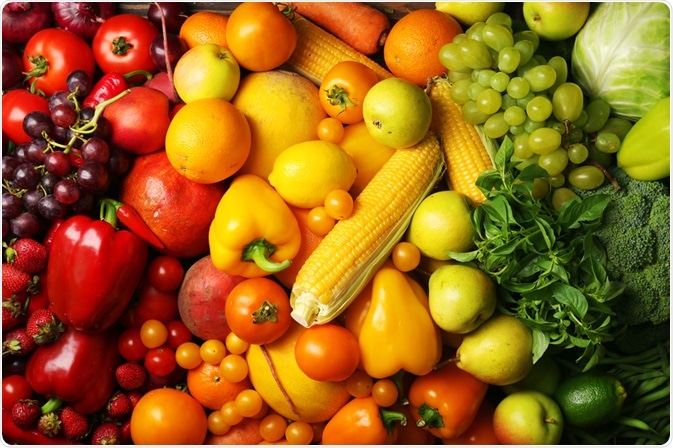Vegetables and fruits are important components of the human diet and should be a major part of the human daily diet.

Image Credit: Africa Studio/Shutterstock.com
Fruits and vegetables contain important phytochemical constituents demonstrated to have beneficial effects on human health.
Fruits and vegetables are rich sources of vitamins A, C, E and K and minerals like potassium, magnesium, calcium. They are also a good source of dietary fibers and possess antioxidant properties. It is impossible to get all these nutrients from a single fruit or vegetable; hence, it is necessary to include a variety of fruits and vegetables in the diet.
What are the consequences of a lack of fruits and vegetables?
The omission of fruits and vegetables makes the body more prone to deficiencies and a plethora of diseases.
Disease caused by vitamin and mineral deficiencies
Some of the diseases caused by vitamin deficiency include:
- Scurvy – caused by vitamin C deficiency
- Night blindness - caused by vitamin A deficiency
- Hemorrhagic disease or bleeding disorder - Caused by vitamin K deficiency
Anemia, osteoporosis, and goiter are diseases caused by a deficiency of minerals (iron, calcium, and iodine, respectively).
Cardiovascular Problems
A diet rich in fruits and vegetables reduces the risk of cardiovascular problems and future complications. The risk of heart disease among individuals taking more than five servings of fruits and vegetables per day is estimated to be reduced by 20%, in comparison to those who eat fewer than three servings per day.
As per a review article by GY Tang et al., vegetable consumption is inversely correlated to the risk of cardiovascular diseases. Research from various epidemiology studies shows that vegetables like asparagus, celery, lettuce, broccoli, onions, tomatoes, potatoes, soybeans, and sesame have great potential in preventing and treating cardiovascular diseases.
These vegetables show their heart-protective action mainly due to their antioxidant, anti-inflammatory, and antiplatelet effects.
Fruits and vegetables help regulate blood pressure and blood glucose; they also have a favorable effect on lipid profile. Fruits and vegetables prevent myocardial damage; modulate enzyme activities, regulate gene expression, and signaling pathways associated with cardiovascular diseases.
Digestive Problems
Fruit and vegetables are a good source of fiber, which stimulates bowel movement and helps in proper and easy digestion of food. Fruits rich in vitamin C and potassium such as apples, oranges, and bananas are particularly good for digestion.
As per a study published by Speciale G et al, in 2016 in the journal Nature Chemical Biology, green-leafy vegetables contain sulfoquinovose, a sugar that acts as an energy source for E. coli. E.coli is a good bacterium, forming a protective barrier that prevents growth and colonization by bad bacteria.
Cancer
Evidence suggests that including fruits and vegetables in the diet reduces the risk of cancer. Berries contain anthocyanin, which has demonstrated an inhibitory effect in colon cancer. Cruciferous vegetables have also shown to have a preventive effect against cancer. A study published in the Journal of Food and Drug Analysis found that the polyphenol phloretin present in apples inhibits the growth of breast cancer cells.
Metabolic disorders
Metabolic syndrome is characterized by impaired blood glucose, elevated blood pressure, dyslipidemia, and abdominal obesity. A diet rich in fruits and vegetables is associated with a reduced risk of diabetes mellitus, hyperlipidemia, and hypertension.
Vitamin C intake, because of its antioxidant effect, has shown to have an inverse association with metabolic syndrome. Fiber-rich food helps reduce low-density lipoprotein and balance blood glucose levels.
The DASH diet, which promotes the consumption of vegetables and fruits to improve blood pressure control, is particularly helpful in preventing metabolic diseases. A study that examined the effect of the DASH diet on blood pressure, found that in people with high blood pressure who followed the DASH diet, the systolic blood pressure was reduced by about 11 mm Hg and diastolic blood pressure by almost 6 mm Hg in individuals.
Vision
Green leafy vegetables and colored fruits contain carotenoids, which increase the eye’s visual performance and help prevent age-related eye diseases. The carotenoids lutein and zeaxanthin have protective action against cataracts; it also helps in preventing aging-related eye diseases and macular degeneration.
Depression
Numerous studies have found links between the consumption of fruit and vegetables and depression. Studies show that depression is less likely in people who consume a variety of fruit and vegetables.
Sources
Tang, G. Y., et al. (2017). Effects of Vegetables on Cardiovascular Diseases and Related Mechanisms. Nutrients, 9(8), 857. DOI:10.3390/nu9080857
Speciale G., et al. (2016). YihQ is a sulfoquinovosidase that cleaves sulfoquinovosyl diacylglyceride sulfolipids. Nat Chem Biol.12(4):215-7. DOI: 10.1038/nchembio.2023.
Bazzano, Lydia A, World Health Organization & Joint FAO/WHO Workshop on Fruit and Vegetables for Health (2004: Kobe, Japan). (2005). Dietary intake of fruit and vegetables and risk of diabetes mellitus and cardiovascular diseases. World Health Organization. https://apps.who.int/iris/handle/10665/43146
Wu KH., et al. (2018). The apple polyphenol phloretin inhibits breast cancer cell migration and proliferation via inhibition of signals by type 2 glucose transporter. J Food Drug Anal. 26(1):221-231. DOI: 10.1016/j.jfda.2017.03.009.
Challa HJ., et al. (2019). DASH Diet (Dietary Approaches to Stop Hypertension) [Updated 2019 May 15]. In: StatPearls [Internet]. Treasure Island (FL): StatPearls Publishing; 2019 Jan-.Available from: https://www.ncbi.nlm.nih.gov/books/NBK482514/
Further Reading
Last Updated: Jan 24, 2020